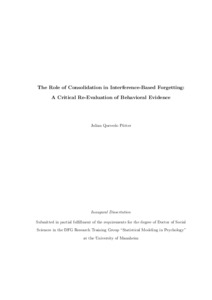|
The role of consolidation in interference-based forgetting: a critical re-evaluation of behavioral evidence
Quevedo Pütter, Julian
![[img]](https://madoc.bib.uni-mannheim.de/68453/1.hassmallThumbnailVersion/QuevedoPu%CC%88tter.pdf)  Vorschau |
|
PDF
QuevedoPütter.pdf
- Veröffentlichte Version
Download (4MB)
|
|
URN:
|
urn:nbn:de:bsz:180-madoc-684534
|
|
Dokumenttyp:
|
Dissertation
|
|
Erscheinungsjahr:
|
2024
|
|
Ort der Veröffentlichung:
|
Mannheim
|
|
Hochschule:
|
Universität Mannheim
|
|
Gutachter:
|
Bröder, Arndt
|
|
Sprache der Veröffentlichung:
|
Englisch
|
|
Einrichtung:
|
Fakultät für Sozialwissenschaften > Kognitive Psychologie (Seniorprofessur) (Erdfelder 2019-)
|
|
Fachgebiet:
|
150 Psychologie
|
|
Freie Schlagwörter (Englisch):
|
memory consolidation , retroactive interference , storage , retrieval , multinomial processing tree (MPT) modeling
|
|
Abstract:
|
The inhibition of memory consolidation has been proposed to explain a wide range of interference-based forgetting phenomena (Wixted, 2004). According to the opportunistic consolidation account (Mednick et al., 2011), reducing, delaying, or minimizing retroactive interference provides ideal conditions for consolidation processes to unfold. At the same time, passive interference reduction accounts that dispense with a consolidation mechanism have been largely neglected. According to the temporal distinctiveness account (Brown et al., 2007), reducing, delaying, or minimizing retroactive interference increases the isolation of memory representations on the temporal dimension of a psychological memory space. Crucially, whereas the opportunistic consolidation account attributes interference-based forgetting to storage processes, the temporal distinctiveness account explains forgetting in terms of retrieval processes. In this thesis, I adopt a storage-retrieval multinomial processing tree (MPT) modeling approach to precisely disentangle storage and retrieval contributions to memory performance following reduced, delayed, or minimized retroactive interference. In the first manuscript (Quevedo Pütter & Erdfelder, 2022), we report an experiment that investigated alcohol-induced retrograde facilitation. Reduced retroactive interference in an alcohol compared to a placebo condition resulted in significantly higher retrieval but not storage probabilities for the previously encoded word pairs. In the second manuscript (Quevedo Pütter et al., 2024), we scrutinized the mechanisms underlying the temporal gradient of retroactive interference. In three experiments, participants engaged in interpolated learning either relatively early or relatively late during the retention interval. Delaying retroactive interference again resulted in increased retrieval but not storage probabilities. Finally, in the third manuscript (Quevedo Pütter & Erdfelder, 2024), we intended to effectively minimize retroactive interference by means of post-encoding waking rest. In two experiments, participants wakefully rested, used social media, or engaged in unrelated vocabulary learning after the original learning phase. In contrast to the first and second manuscript, we found rest-induced retrograde facilitation to be driven by storage processes. Overall, this mixed result pattern indicates that interference-based forgetting can largely be explained in terms of retrieval processes. Opportunistic consolidation seems to be inhibited only under rather specific conditions. In light of these conclusions, I propose an integrative account of interference-based forgetting that combines elements of the temporal distinctiveness and the opportunistic consolidation account.
|
 | Dieser Eintrag ist Teil der Universitätsbibliographie. |
 | Das Dokument wird vom Publikationsserver der Universitätsbibliothek Mannheim bereitgestellt. |
 Suche Autoren in Suche Autoren in
Sie haben einen Fehler gefunden? Teilen Sie uns Ihren Korrekturwunsch bitte hier mit: E-Mail
Actions (login required)
 |
Eintrag anzeigen |
|
 ORCID: 0000-0002-7340-9937
ORCID: 0000-0002-7340-9937



 Suche Autoren in
Suche Autoren in